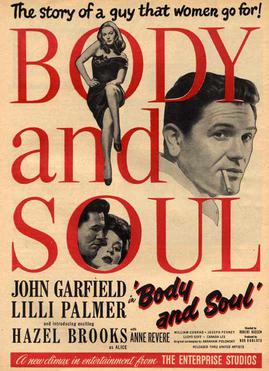
Body and Soul is Robert Rossen's take on the boxing film genre. It begins In medias res with Charley Davis, a rags-to-riches boxing champion visiting acquaintances from his past the night before his title defense fight. The rest of the film then takes place as a flashback Charley has during a nap, up until the fight itself. Rossen's use of these narrative devices help to establish the reflective and regretful tone of the movie. The audience is able to see Davis' journey not only in the typical rise and fall arc of the boxer, but also through the eyes of a protagonist, with every joyful memory a reminder of what is lost, and every mistake or bad decision a step closer to where he currently is.
At it's core, Body and Soul is an economic film. It explores the conflict between market values and economic values, as described by Leger Grindon. With money constantly involved in every interaction and conflict our character has, it is no surprise that in the final boxing match of the film, the opponent is given little mention or importance. The true antagonist of the film, that Davis must contend with and eventually overcome, is greed.
Davis starts off as the poor son of the owners of a candy store. Young and ambitious, he is eager to pursue a career in boxing. Through situation and circumstance, he is unlikely to be very successful pursuing any other career, much to his mother's worry. To begin his career he needs equipment, which he alone was not able to afford. A $10 gift from his father gets the ball rolling for him. In this scene the conflict of economic values vs family values is established. The mother, who will throughout the movie represent "the strength and moral purity of the poor" despises the idea of Charley pursuing a career in boxing(Casty 4). She retorts to his ambition of being a fighter: "Well fight for something, not for money", illustrating her disdain for violence in the name of greed. Meanwhile the father's gift, a cash transaction, a market action, simultaneously signifies his approval, and the triumph of market forces.
Unfortunately for the Davis family, the candy shop is soon after struck by a bomb, killing his father. Living with only his mother, he was forced to set aside his boxing aspirations. But with the candy store gone and the primary breadwinner of the family buried, it was not long before the market demanded that Charley box. With a new girlfriend to impress, two rents to pay and a dependent to support, Charley needed money, and he was too proud to accept charity from a welfare organization. Again the economic vs family values conflict erupts, as his mother shouts "better to buy a gun and shoot yourself", to which he retorts "you need money to buy a gun".

Rossen's exploration of the corrupting influence of money and greed is very relevant to the time period of his films. Rossen was known to have been a member of the communist party before the production of this film, and was even blacklisted for several years due to his communist ties.
His perspective on capitalism, and the corrupting influence of money, doubtlessly colored his portrayal of such charming characters as Alice, the gold-digging, promiscuous seductress. When conversing with a former lover, she remarks: "I don't care where his heart is,only the money".

And the cold, emotionless gangster-promoter, who let a fight be arranged with the knowledge that one of the boxers had a blood clot, which could be fatal if he was hit too hard.
In the end, Charley does reject the greed, and refuses to throw the fight. Hanging in the balance was his family, his future with Peg, and the respect of his neighborhood. As Singer puts it: "Ultimately, it is the reminders of family and of his origins that turn him around". The use of flashback hammers home to th audience Davis' sense of regret and loss, and allows what would have appeared to have been a last minute change of heart, to be a final act of defiance in a life led astray. Charley is able to defy greed by winning the fight, to defy the market by choosing to hold onto the things money cannot buy,to defy the gangster-promoter turning his favorite phrase "Everybody dies" back on him, to reject the seductress, and return triumphantly home.






Kevin,
ReplyDeleteI really liked your analysis on this film. What stood out to me was when you discussed the economic vs family values and how Charley's mother said "better to buy a gun and shoot yourself" and he responds with "you need money to buy a gun". This was a great scene to use to demonstrate that type of conflict.